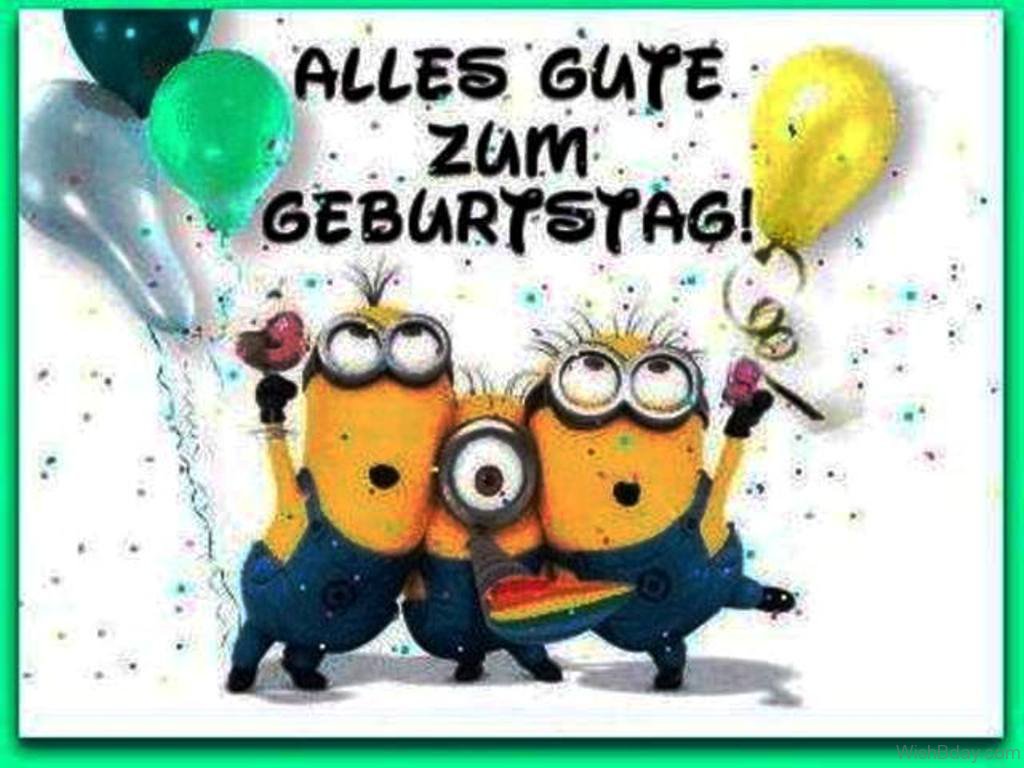In the ever-evolving tapestry of global culture and communication, language plays a pivotal role in shaping our interactions and expressing our emotions. When it comes to celebrating life’s milestones, the art of conveying “Happy Birthday” transcends linguistic boundaries. For those eager to extend heartfelt greetings in the melodious tongue of Germany, understanding the nuances and variations of their birthday wishes is essential. Join us as we delve into the enchanting world of German birthday salutations, unraveling the myriad ways to wish someone a joyous and memorable celebration.

Image: www.pinterest.com
“Alles Gute zum Geburtstag” is the classic and universally recognized expression for “Happy Birthday” in Germany. Its literal translation is “All the best for your birthday,” conveying sincere wishes for a day filled with joy, good fortune, and abundance. However, the German language offers a treasure trove of alternative expressions, each carrying its unique charm and cultural significance.
A bouquet of German birthday wishes:
“Herzlichen Glückwunsch zum Geburtstag” translates to “Hearty congratulations on your birthday” and is a formal and respectful way to extend well wishes to someone you may not know intimately. The word “Herzlichen” adds a touch of warmth and affection to the greeting, making it suitable for both personal and professional contexts.
“Ich wünsche Dir alles Liebe und Gute zu Deinem Geburtstag” is a heartfelt wish that conveys “I wish you all the love and best on your birthday.” The phrase “alles Liebe” encapsulates not only romantic love but also familial affection and general well-being.
“Viel Glück und Gesundheit zum Geburtstag” emphasizes the importance of happiness and good health with the greeting “Much luck and health for your birthday.” In German culture, health is highly valued, and this wish reflects the desire for a long and fulfilling life.
“Hab einen wunderschönen Geburtstag” is a simple yet elegant way to say “Have a wonderful birthday.” The word “wunderschönen” evokes images of beauty, joy, and splendor, setting the tone for an exceptional celebration.
“Ich hoffe, Du hast einen tollen Tag” conveys the wish “I hope you have a great day.” While less elaborate than some of the other expressions, this greeting is sincere and straightforward, expressing the desire for a day filled with happiness and enjoyment.
Regional variations: A kaleidoscope of birthday greetings
The diverse regions of Germany have nurtured their own unique ways of expressing birthday wishes. In Bavaria, the southernmost state of Germany, “Vergelt’s Gott” is a common phrase that translates to “May God reward you.” This expression is rooted in the region’s strong Catholic tradition and carries the connotation of divine blessings and gratitude for another year of life.
In the northern region of Germany, including Hamburg and Bremen, the greeting “Moin, Moin, un’ Happy Birthday” is a playful and informal way to wish someone a happy birthday. The term “Moin, Moin” is a friendly salutation that is particularly common in the coastal areas of northern Germany.
Special considerations for formal and informal settings
The choice of birthday greeting in German also depends on the formality of the situation. In formal settings, such as when addressing a superior or a person you do not know well, the use of “Sie” (the formal pronoun “you”) is appropriate. For example, “Ich wünsche Ihnen alles Gute zum Geburtstag” would be the correct way to extend birthday wishes in a formal context.
In informal settings, with friends, family, or people you are close to, the use of “du” (the informal pronoun “you”) is acceptable. The birthday greetings mentioned earlier can be adapted to informal settings by using the informal pronoun “du.”

Image: sanderscelia.blogspot.com
How Do You Say Happy Birthday In Germany
Beyond words: Cultural nuances of German birthday etiquette
In addition to the spoken word, German birthday etiquette includes certain customary actions that add depth to the celebration. The act of giving gifts is an integral part of German birthday traditions. Gifts are typically wrapped in colorful paper and adorned with ribbons or bows. It is considered thoughtful to choose a gift that is tailored to the recipient’s interests or hobbies.
In some parts of Germany, it is customary to sing the birthday song “Zum Geburtstag viel Glück” (Happy Birthday to You) to the honoree. The song is often accompanied by clapping and lively gestures, creating a festive atmosphere.
Lighting candles on a birthday cake is another common German birthday tradition. The number of candles usually corresponds to the age of the birthday person. Blowing out the candles in one breath is believed to bring good luck and


/GettyImages-1303637-two-way-mirror-57126b585f9b588cc2ed8a7b-5b8ef296c9e77c0050809a9a.jpg?w=740&resize=740,414&ssl=1)


